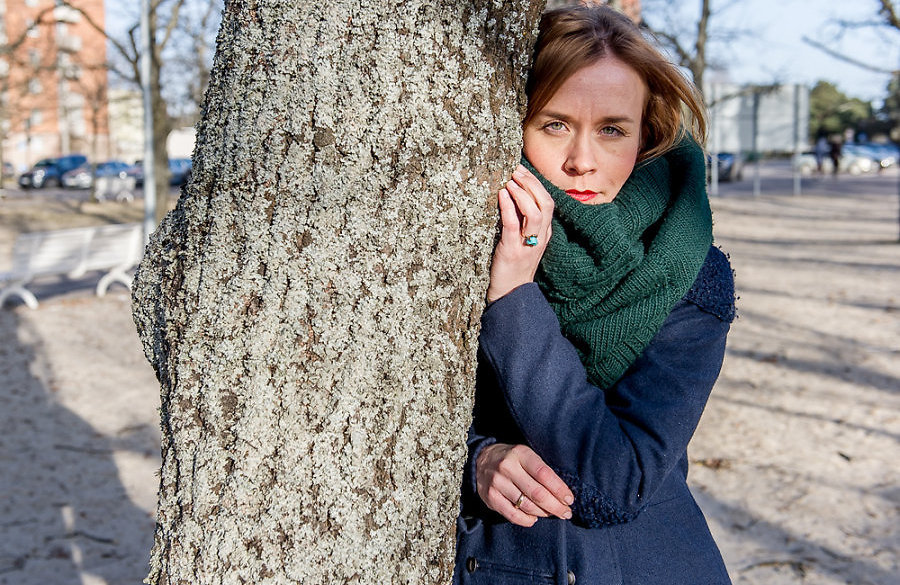Evelin
Evelin Võigemast first heard about blood donations from her parents. In their household, it was common to hear that her mother or father “went to give blood today.”
“The first time I gave blood, it was more out of curiosity,” she says. “Maybe I caught it from my parents. I’m not afraid of needles – on the contrary I’m happy to watch the whole procedure. And I’ve always been in awe of the medical profession. Now, I don’t want to poke anyone with a needle, I wasn’t interested in becoming a doctor, but it is in some way all exciting for me,” says Võigemast, who is an actress.
“I have always known on some level that someone may really need my blood. And it’s also good to know that my blood gets checked from time to time and if there’s anything amiss, I assume I’d be contacted. And anyway, occasional bloodletting is probably good for the body.”
Is it charity, a chance to be a better person?
Yes, that aspect certainly comes into play, but I don’t think about that very often. As I have a blood type that is in high demand, I feel a responsibility. There are few of us ‘negatives’ as it is – 20-30 percent of all donors.
There’s a few old sayings about blood in Estonian, such as “knocks the blood out of you.” What knocks the blood out of you?
“Once I had to call an ambulance for a woman who was hit by a car at a crossing. The moment when you are next to an injured person and time stands still….Time has a different…density, something dramatic happens. As I have had so little experience with hospitals and doctors, saving lives is mainly an abstract thing. It is wonderful to see how my blood flows to into a package, how it behaves in there and then is sent to refrigeration and testing.
I remember the first time I went to give blood. As someone who grew up in the 1980s, my experiences with doctors weren’t the most pleasant. In general, people had a different attitude then. But the energy in the Blood Centre is different from that of hospital. In hospital, people have their fears, concerns, diagnoses and diseases, often face to face with death.
All those people are simply amd sincerely glad that you’ve come to give blood. And the people are truly thankful.
But people come to the Blood centre voluntarily, to do good, 400 ml at a time. And the way you are greeted at reception by nurses is something totally different, too. From the moment that you’re handed a questionnaire and you go into the examination room and first give a drop of blood to check haemoglobin. Then you go up to the second floor and get to the actual procedure. All those people are simply amd sincerely glad that you’ve come to give blood. And the people are truly thankful.
(Voice rises in volume) I remember the glowing positive emotion very clearly and it has been with me all these years. It is also a major reason that I always come back.
Yes, I have a mug with a pelican on it and I always eat cookies and drink juice. (Smiles.) It’s a good feeling. But mugs and cookies aren’t the main thing. It’s a bit strange that you’ve done good in an abstract way without really sensing that the blood could save someone. But you are treated and talked to in a nicer way. And you feel much better afterward.
How important is it to get something in return?
It is and it isn’t. You always get something in return, take that feeling for example. Just looking into the eyes of the people working at the centre, you see that emotional returns are extremely important.
You work is the same way.
(Laughs.) Again, yes and no. Sometimes people don’t like what they see on stage.
Some of us have the energy to be good while others only whine. How do the nurses at the Blood Centre find the energy to smile?
It is probably mutual, as people come there only with good intentions. No one asks: why do I have to wait so long? That would be absurd! And you’re not in a rush to leave, either – but you take a minute for yourself to recover.
Here’s an example: You work at a registration desk somewhere and people are always cross over the long lines to get to see a physician. Or you’re at the store: shoppers are tired from their day – they feel harried and under pressure, and have only a few cents to spend, and know that they still have to pick up their kids from school, make dinner…but what to make…
I truly believe you can be happy if you decide to be. Just like that.
It’s hard to share or radiate positive energy if it isn’t anywhere to be had, if you don’t get anything in return from the others.
(Pauses.) It’s all a matter of attitude. Certainly there are people who have a hard life but can still be happy doing what they do. And some seem to be doing well, but they can’t find that ray of sunshine.
I’ve read in the papers how people have recently said that attitude is a matter of making a decision. I truly believe you can be happy if you decide to be. Just like that. How you view and appraise the things in your life. There’s so much to be thankful for!
The actress was interviewed by Piret Kooli, the unabridged article in Estonian was published in daily Eesti Päevaleht supplement LP in April 2014.
